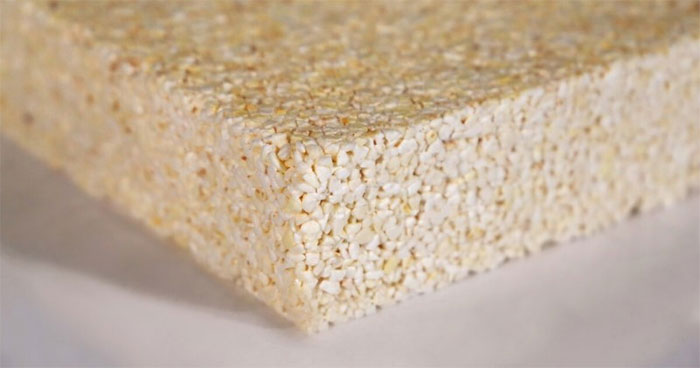EPS foam, also known as expanded polystyrene, is a type of plastic foam made from polystyrene granules that are heated and expanded, resulting in a compound that contains pentane gas (C5H12).
The synthetic composition of EPS granules consists of 90-95% polystyrene and 5-10% blowing agents such as pentane or carbon dioxide. EPS foam is inexpensive and lightweight, but it is not biodegradable and difficult to recycle. Therefore, German scientists have developed a viable alternative – foam made from popcorn.

In addition to kernels, damaged corn cobs can also be used in production.
Professor Alireza Kharazipour from the University of Göttingen first came up with this idea over 10 years ago when he bought a bag of popcorn at the cinema. Since then, Professor Kharazipour and his colleagues have devised a method to use this material as a substitute for EPS. The material made from popcorn is cost-effective, biodegradable, and recyclable.
The scientists begin the production process by chopping up corn kernels. Then, the research team uses pressurized steam to expand them. Next, a binder derived from plant proteins is mixed with the expanded granules. The mixture is then pressed into molds. Once the binder has hardened into a solid block, the scientists remove it from the mold and prepare it for use.
According to the research team, the corn-based material has better thermal insulation properties than EPS and is not easily flammable. At the same time, the material can be composted or shredded for reuse. It can also be used to produce biogas or even as feed for livestock. In addition to corn kernels, damaged corn cobs can also be utilized in production.
This technology has recently been licensed for production to the Bachl Group of Germany. This group will commercialize and utilize the material in building insulation. Other applications for this material include protective/insulating packaging, sports equipment parts, and automotive components.
“This is my contribution as a scientist towards a clean environment, free from plastic products. This new process, based on plastic industry methods, allows for the industrial-scale production of insulation panels at an economical cost.
Especially in the field of building insulation, this material ensures natural thermal insulation. Additionally, these products have waterproof properties, opening up many practical application opportunities and extending their service life,” Professor Kharazipour shared.


















































